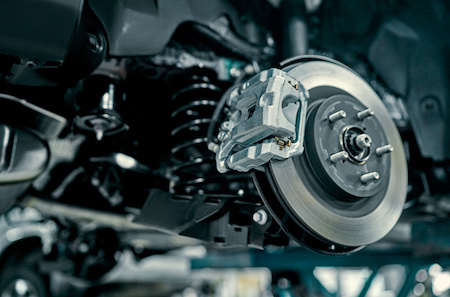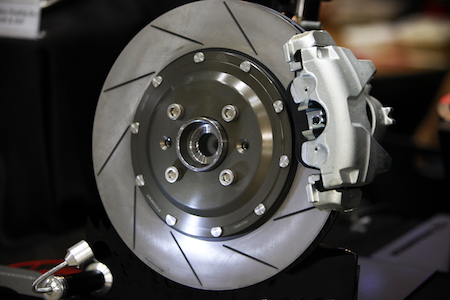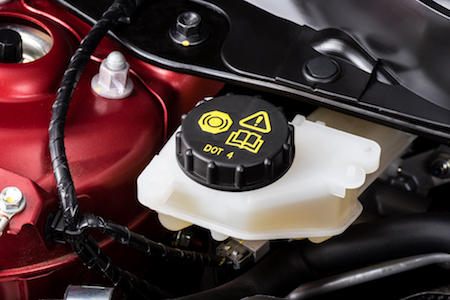Imagine a car without brakes. Pretty scary picture, right?
Especially here in Colorado, where you might head up into the mountains from time to time. You’re flying down the road back home after a day of skiing and – no brakes! Scary!
But it doesn’t even have to be a giant hill that creates a bad picture in your mind. Slowing down for a stoplight can be a harrowing experience without brakes.
Brake fluid is an important part of the braking process. What does it do? And why should you care?
What is brake fluid?
You know that satisfying feeling when you press your foot on the brake pedal, and your car gracefully comes to a stop? Well, that magic is primarily thanks to a lesser-known hero called brake fluid.
Brake fluid is behind this most important safety mechanism. It’s a specially formulated hydraulic fluid that plays a critical role in ensuring your brakes work seamlessly.
When you hit the brakes, this fluid transmits the force from your foot on the pedal to the brake components at each wheel, enabling your car to stop efficiently and safely. It turns your brake pedal tap into a smooth and reliable stop. One you can’t go without.
Brake fluid must be the correct viscosity
Imagine this: you’re trying to squeeze ketchup out of a bottle. If it’s too thick, it won’t flow smoothly, and if it’s too thin, it might squirt out uncontrollably. Brake fluid follows a similar principle.
Viscosity might sound like a complex term from a science class, but in layman’s terms, it simply refers to the thickness or consistency of the fluid. If it’s not the correct viscosity, it won’t transmit the force effectively, compromising your ability to stop your car when needed.
When it comes to brake fluid, getting the viscosity right is crucial for your braking system to function correctly. It ensures a smooth and controlled stop every time you hit the brakes. It’s a small detail that makes a big difference in your overall driving safety.
Brake fluid should resist rust and corrosion
Brake fluid also provides another vital trait – its ability to resist rust and corrosion. Your car’s braking system isn’t just about friction between pads and rotors; it’s also about the smooth operation of various metal components. Imagine the intricate dance between pistons, cylinders, and brake lines every time you step on the pedal.
Brake fluid has anti-rust and anti-corrosion properties to act like a shield, protecting these metal components from the relentless wear and tear of time and the elements. Moisture can find its way into the braking system, and if left unchecked, it can lead to rust, corrosion, and a host of problems.
A brake system compromised by rust isn’t just inefficient; it’s a safety hazard waiting to happen. Regular checks and maintenance ensure that your brake fluid remains a formidable defender, keeping your braking system in top-notch condition and ensuring your safety on the road. It’s like giving your car’s braking components a suit of armor against the forces that seek to corrode its efficiency.
How does brake fluid work?
Applying pressure to the brake pedal signals a series of actions that set the braking system into motion. The brake fluid, being incompressible, plays a pivotal role in transmitting this pressure. Picture it as a messenger, swiftly carrying the command from your foot to the brake components at each wheel.
As the brake fluid travels through the brake lines, it activates a piston within the brake caliper. This piston then presses against the brake pads, creating friction against the brake rotor. It’s this friction that slows down your wheels and brings your car to a stop. The key here is that brake fluid facilitates this entire process by transferring force effectively and consistently.
In essence, every time you bring your car to a stop, it’s like a choreographed dance between your foot, the brake pedal, and the fluid – a dance where precision is everything. Ensuring that your brake fluid is in good condition is not just about maintaining your car; it’s about preserving the harmony of this intricate ballet and, most importantly, ensuring a safe and reliable stop every time you hit the brakes.
Why it’s crucial to change your brake fluid
With time and continuous use, brake fluid faces wear and tear. The smooth, clear fluid you started with can become contaminated with moisture, air, and particles from the braking system. This contamination affects its ability to transmit pressure effectively, diminishing the overall performance of your brakes.
Imagine driving with tires that have seen better days – it’s not going to be as smooth or as safe. The same goes for your brake fluid. If it’s not regularly changed, it can lead to decreased brake efficiency, increased stopping distances, and even potential damage to critical components.
Changing your brake fluid restores its ability to perform at its best. It removes the accumulated contaminants, ensuring the fluid remains clean and efficient in transmitting the force from your foot to the braking system.
It’s a small investment that pays off in the safety and performance of your vehicle.
Signs brake fluid may be failing
Occasionally, your car might drop hints that it’s time for a fluid refresh.
Pay attention to the color of your brake fluid. Fresh brake fluid is usually a clear or slightly yellowish color. If you notice it turning darker, resembling used motor oil, it’s a sign that it has absorbed contaminants and is losing its effectiveness.
Another sign to watch for is a soft or spongy brake pedal. When brake fluid becomes contaminated, it can introduce air bubbles into the system, leading to a loss of pedal firmness. If you find yourself having to press the pedal further than usual or experiencing a mushy feel, it’s time to consider a brake fluid change.
Listen for any unusual sounds during braking. If you start hearing squealing, grinding, or other odd noises, it could indicate that your brake fluid isn’t doing its job effectively.
Keep an eye on your braking performance. If you notice a decrease in stopping power or an increase in stopping distances, it’s a clear sign that your brake fluid might be due for a change.
Your car communicates with you in subtle ways, and understanding these signs can help you address issues before they become significant problems. So, if your car sends out distress signals, consider it an invitation to give your braking system the care and attention it deserves.
How can we help you?




